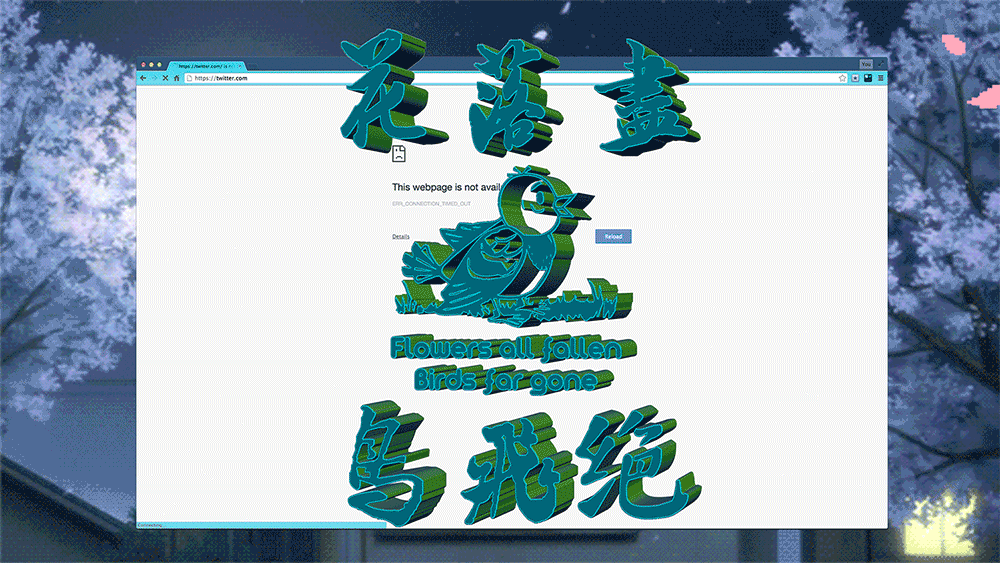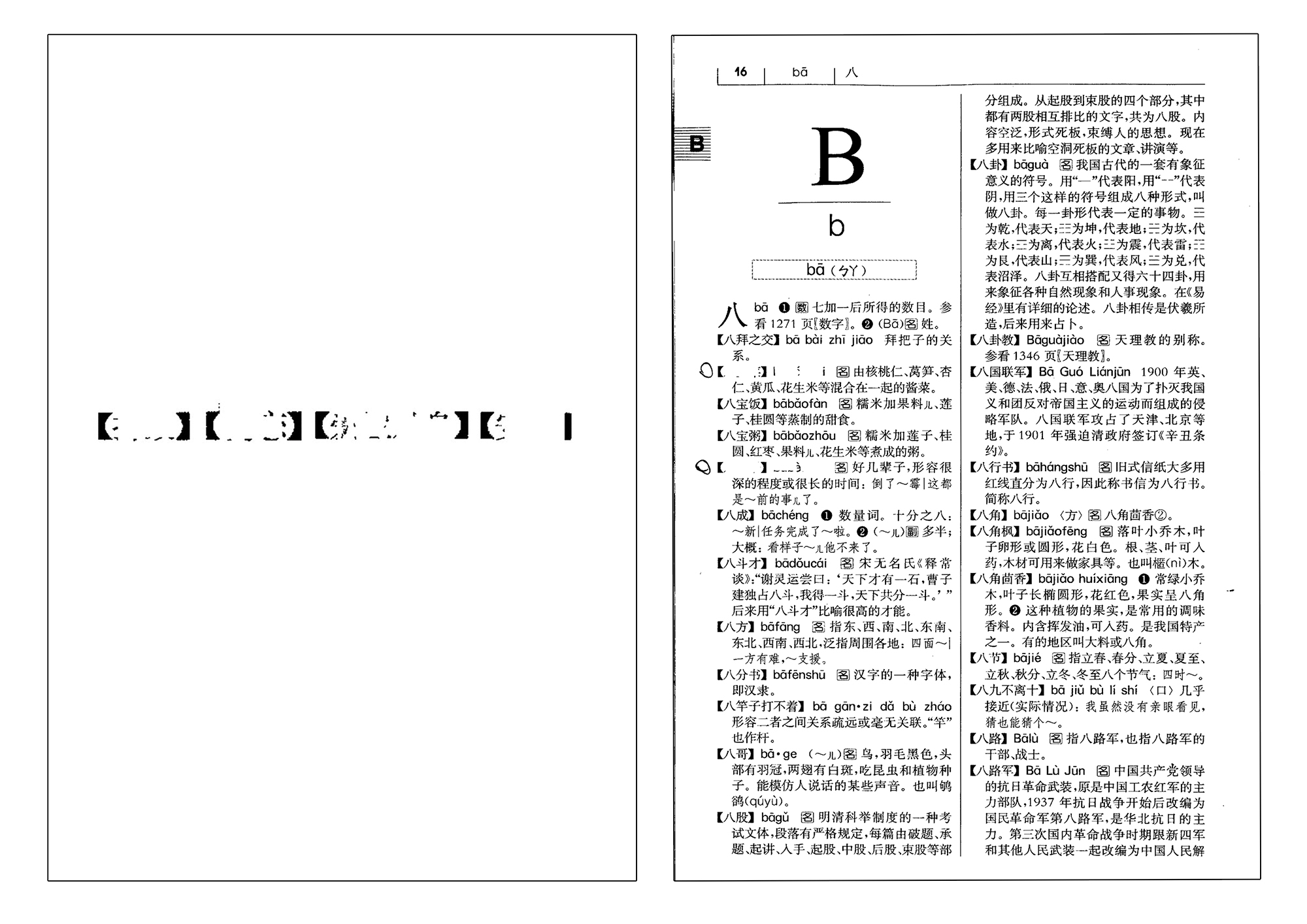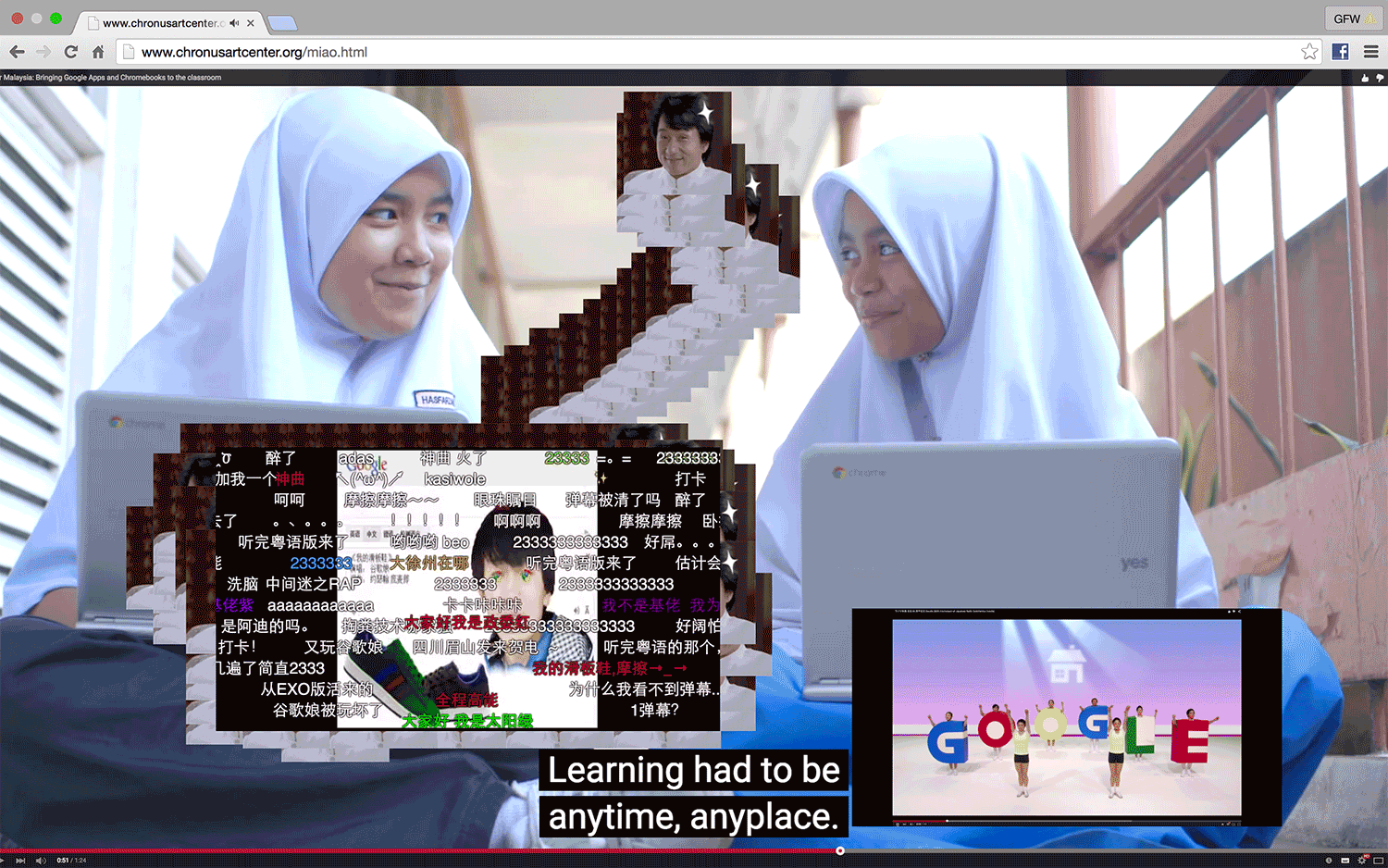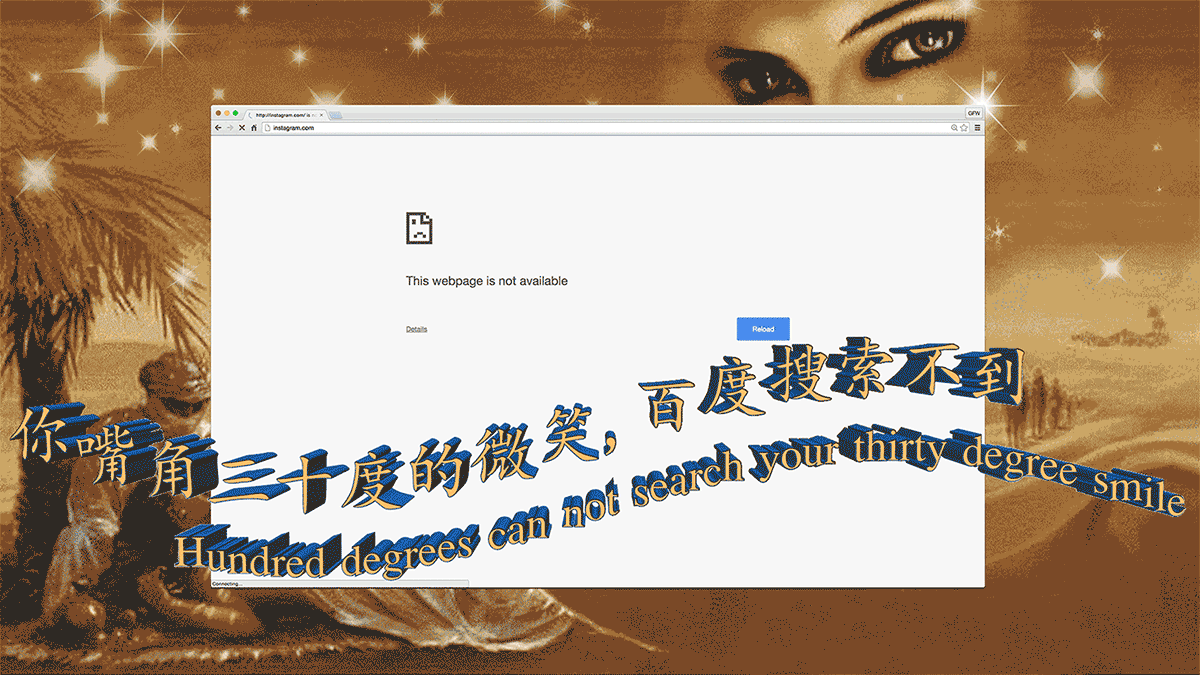The latest in a series of interviews with artists who have a significant body of work that makes use of or responds to network culture and digital technologies.

Miao Ying, flowers all fallen, Birds far gone (2015)
Your graduation show was the first time you involved the internet in your work. You made a new dictionary composed entirely of censored terms which you spent 3 months compiling, looking up every single word in the Chinese dictionary on google.cn, and recording all those that met with a blocked result. It was a hugely laborious piece which resulted in an actual book (Blind Spot, 2007). More recently, Is it me you are looking for? (2014) also included censored content, combining Lionel Richie's 1984 Hello music video with three images from the "LAN Love Poem.gif" series (2014), in which "website unavailable" pages from censored websites are overlaid with kitschy slogans from Chinese internet poetry.
How would you describe your attitude to censored pages as source material? The way you use it now, a blocked page is always the start of something else; the "website unavailable" notice has become a familiar backdrop used again and again. It comes across more lightheartedly, almost like the devil you know.

Miao Ying, Blind Spot, artist book (2007)
I guess that when I was younger, I saw censorship more like an enemy, with more limitations than possibilities. In 2007, when I made the first piece Blind Spot, blogs were trending in China. Although blogger.com was blocked, there were some great local blog servers, and for the first time as someone from the post '80s generation, I got to know a lot of public intellectuals from their blogs—that was enlightening for me. I was a senior in college, and very idealistic. I wanted to be more responsible for society. On the other hand, I was starting to love the internet because blogs, Google, and Wikipedia really changed the way I gathered information. When I was a kid, I never truly trusted the school books and the newspapers in the same way that I didn't trust my English teacher’s accent. It was totally mean and cynical because I felt everything could be censored or manipulated here. Even when the internet came out in China, it was censored to begin with, but at least if knew a way to get past it, I could get past the "second hand information."
The first internet piece I made was trying to address censorship with an end goal of bringing change to it. Over the years, I feel like censorship has changed me instead. I was sad, angry, and finally accepted it, like a phase of a breakup. Censorship is like a nasty boyfriend/girlfriend you cannot tame. It's even worse than that; it's actually more like developing Stockholm syndrome—a traumatic bonding. This kind of love takes place in an isolated environment where the hostage-taker—who makes the rules—becomes so powerful that you gradually fall in love with them.
Miao Ying, Is it me you are looking for? (2014)
For instance, when I first came back to China from the States, I realized that everybody was starting to use the Chinese version of Twitter—Wei Bo. I refused to use it at first because the only reason it was popular was because Twitter was blocked, and Wei Bo agreed to cooperate with the government. Later, I realized it was silly and pretentious to not use it, because the beauty of it is self-censorship. That's when I became fascinated by the local Chinese internet and realized how rich and unique it is as a material. In the music video for Hello, Lionel Richie fell in love with a blind girl and in the end she made a sculpture of him from her observation; this double blindness is quite like the romantic relationship between me and the Great Firewall.
You have used different physical installations to display your work. For the exhibition "Gif Island" at V Art Center in Shanghai last year, Landscape.gif (2013) was composed of deckchairs draped with emoji-printed towels. Multiple touch-screen devices were angled closely over the chairs, displaying trembling GIF images—too many to watch at once. Wires and crumpled pieces of paper bearing the Chinese meme "Zan" (akin to the "Like" of Western social media) were strewn about the floor. Part of the same exhibition, APP-nosis (2013–14) suspended iPhones at the apex of open metal pyramids. On the floor below, real turf and printed cushions invited one to recline passively beneath the screen; the square background hue of an app was projected on the wall with a soundtrack of waves breaking.

Miao Ying, APP-nosis (2013-2014)
These installations convey subtly different atmospheres around interaction with smart phones; the setups are both intuitive and quite absurd. I wondered if you could talk about them, perhaps alongside your own experience, the moods you imagine when you build them, and how they come across to the viewer.
Both of them come from daily experience, I wanted to build something that is familiar—extremely daily, yet ceremonial. People are looking at their apps all the time, but they are not really looking at them. I don’t know if people fully realize how technology is changing or controlling our lives. The work deals with the integration of technology and the human spirit. Technology is the "fifth element" on the meditation pyramid. By staring at the giant, non-functional, color-changing app icon and sitting inside the pyramid, the participant connects to the universe through the smart phone; the smart phone amplifies the essences of the universe, which travels back to people's bodies, then to their souls.

Miao Ying, landscape.gif (2013-2014)
Landscape.gif is inspired by bestselling items on TaoBao (the Chinese equivalent of eBay); iPad holders for people to use when they are lying on the bed. The way you look up at it has the psychological implication of you looking up towards a higher power. Is it your iPad or God that is watching over and looking after you? I wanted to make a blanket for the people who are busy staring at the screen while enacting this daily ceremony—I don't want them to get cold, you know? I wanted to make a local internet blanket. This "Zan" ("Like") blanket is covered in original emojis inspired by Chinese New Year door decorations, only these emoji themes wish for; "Eat Well," "Get Rich," "Have iPhone6+" and "Emigrate to the USA." At Chinese New Year, along with wishing for wealth, people wish for more "likes" on social media.
Your work has a deliberate "Chinese internet" aesthetic; you use this as a medium, for example by including Bilibili videos and the Jackie Chan shampoo ad in the new piece you showed in Venice, A Healthy Fear (2015). How much of a boundary is there between what you make and what you look at for research? Do you see your work as part of it all, or hope that it will eventually be seen by the same users who watch Bilibili etc.?

Miao Ying, A Healthy Fear (2015)
I call those "video player works," not video works, as I have no interest in video art. The videos in my works are always appropriated media, and they are part of a bigger piece to add context to it. You are not just watching the video, you are watching it being watched. I like the idea of "video sharing" instead of video. The ads and the quality of the video depend on your internet speed, and in the end you can click on suggested videos YouTube provides for you, and you end up watch something else. In A Healthy Fear, the background is a snapshot of an official Google ad from the Google YouTube channel about bringing Google apps and chrome books to classrooms in Malaysia, where two Muslim kids with perfectly satisfied smiles on their faces hold Google laptops on their laps. Another video is also from the official Google channel, where in another Asian country, Japan, people are doing a calisthenics routine with Google letters. What is funny is that there is neither Google nor YouTube in China, but that doesn't stop people from using Google. The recording of the video is by a Chinese netizen who used Google Translate to "sing"(read) the most unlikely viral internet song, My Skate Shoes, which is a voice for the internet meme "diaosi" (self-depreciating loser). The GIF of Jackie Chan shaking his head is a Wechat gif sticker. People are celebrating "Duang" as a viral meme that originates from a commercial featuring Jackie Chan in which he described his hair quality as being "Duang" – an onomatopoeic word for bouncy-ness. This commercial was remixed by Chinese Netizens 11 years later, (when Jackie Chan’s son was arrested on drug charges) to the tune of My Skate Shoes. Together they create a new meme, "Duang," to represent something disingenuous, but in a humorous way. This remixed video was first uploaded to Bilibili where it trended rapidly, then quickly the GIF of Jacky Chan shaking his head saying "Duang!" was all over WeChat. GIFs of a meme have become humorous topics to light up a conversation.
I would love to see comments flowing around my work. It would be a work of art in the age of social media.
The background for Hundred degrees can not search your thirty degree smile is a "website unavailable" notice for Instagram; across the bottom potion of the image is an undulating line which reads "Hundred degrees can not search your thirty degree smile". This is taken from an online signature and contains particular references. Could you explain the different elements which compose this GIF, and why you chose this signature?

Miao Ying, Hundred degrees can not search your thirty degree smile (2015)
In Chinese, "bai" means hundred; “du” means degrees. This double entendre, "hundred degrees" is the Chinese search engine Baidu, which became the main search engine back in 2010 when Google left China. Maybe years later, the younger Chinese generation might think Google copied Baidu. This poem I found online; it reads, "The thirty degrees of your smile can not be found on Baidu." I pictured this poem as depicting a heart-broken guy looking for his former girlfriend’s picture on Instagram. Her perfect, charming, unique smile cannot be found because Instagram is blocked in China. Therefore, he had to search for her smile on Baidu, aka: "Hundred degrees," and found nothing.
This series of works involved a large amount of research, reading and collecting online signatures. I usually picked the ones that were the most "cheesily" creative, which gave me a visual feeling about this poem. Then I found a GIF that fit the mood of the poem and created the 3D wording, and imagined how the animation would look before I even started to put everything together. in this one, "she" is hiding behind the browser as if the smile cannot be found on Baidu.
Also, I think it is very important that those works are in GIF format. GIF is the format that was born for the internet. A GIF is comprised of multiple still images that can be viewed in a browser, which plays the animation automatically. Only recently have computer operating systems made it possible to view GIFs without opening them in a browser. I think it’s an ironic use GIFs to show the disconnection of the internet. To me, it’s an interesting paradox.
Blocking off parts of the internet is an unpleasant and manipulative action by the authorities which already has a long history in China. I feel that people outside the Chinese internet might see it purely as a restricted area that is generally negative for its users, whose online experience is limited; those not engaged with the "Chinternet" are not in contact with or experiencing the web as Chinese netizens do. Your work distils a different sensation, however—a humble charm and a sort of detached sympathy; to me, it radiates a certain pride about online culture and community in mainland China. Inside those boundaries, there are netizens who are hugely responsive and alert – perhaps much more-so than those who can browse freely.
Things can change very fast in China; it can be a good and bad thing. 20 years ago, personal computers were far from popular here. Today, China has the largest market of smart phone users in the world. As far as I know, WeChat is the most entertaining application for instant communication, and the way Chinese use GIF stickers in WeChat is mind-blowing.
I admire the internet for its infinite collective sense of humor, which the Chinese usually lack. It seems that with the internet, the Chinese are starting to show a sense of humor by being able to laugh at themselves. The internet is still the closest thing to free speech in China.
When I first came to the United States to study, I was shocked by how much free speech Americans had. Does Jesus Christ bless America? I almost felt embarrassed… it was like walking into a nude beach by accident—wearing clothes is more awkward than no clothes. At this point in time, from an outsider’s perspective, looking inside the Great Firewall might be like showing up to Carnival in Brazil wearing a tuxedo and expecting to ballroom dance.
From one side of the wall, the Chinese internet appears to be a barren wasteland, yet despite its limitations, it has been evolving and growing—even faster than the net outside the wall. New memes are created rapidly, depending on what underground culture decides to make pertaining to mainstream culture and internet with Chinese characteristics, which is self-censorship. If you know something will be censored, you can go around it, using homophones, making up new words, etc., which all involve a sense of humor and intelligence. You will be shocked by how creative netizens are. The limit of the Chinese internet is what sets it free.
Questionnaire:
Age: 30
Location: Beijing, Shanghai, Chinternet, Internet
How/when did you begin working creatively with technology?
When I was a sophomore in college, I had to make an animation by using Photoshop and the visiting French professor failed me...T__T, because my PS skill was very limited Y__Y. I had no interest or experience with technology, but we had a huge prize for scholarship—money lured me to work harder with technology. One semester later I was introduced to Rhizome, that's when I began to fall in love with technology, for real.
Where did you go to school? What did you study?
I hold a Bachelor of Fine Arts from the New Media Arts department from the China Academy of Fine Arts in Hangzhou, and an MFA from the School of Art and Design at Alfred University, NY, USA, with a focus in Electronic Integrated Arts.
What do you do for a living, or what occupations have you held previously?
I am a full time artist now, but in the past I have worked as an assistant professor, an art gallery manager, a graphic designer and a TV show producer.
What does your desktop or workspace look like? (Pics or screenshots please!)
My workspace:

My desktop and the desktop of a random netizen I found online, whose operating system is in Spanish:

Current exhibition: "HOLDING A KITCHEN KNIFE TO CUT THE INTERNET CABLE"
"Folklore of the Cyber World:An Online Exhibition for the Chinese Pavilion" Le Biennale di Venezia 2015


Blocking off parts of the internet is an unpleasant and manipulative action by the authorities which already has a long history in China. I feel that people outside the Chinese internet might see it purely as a restricted area that is generally negative for its users, whose online experience is limited; those not engaged with the "Chinternet" are not in contact with or experiencing the web as Chinese netizens do. Your work distils a different sensation, however—a humble charm and a sort of detached sympathy; to me, it radiates a certain pride about online culture and community in mainland China. Inside those boundaries, there are netizens who are hugely responsive and alert <a href='http://www.artedigital-mx.com'>-</a> perhaps much more-so than those who can browse freely.